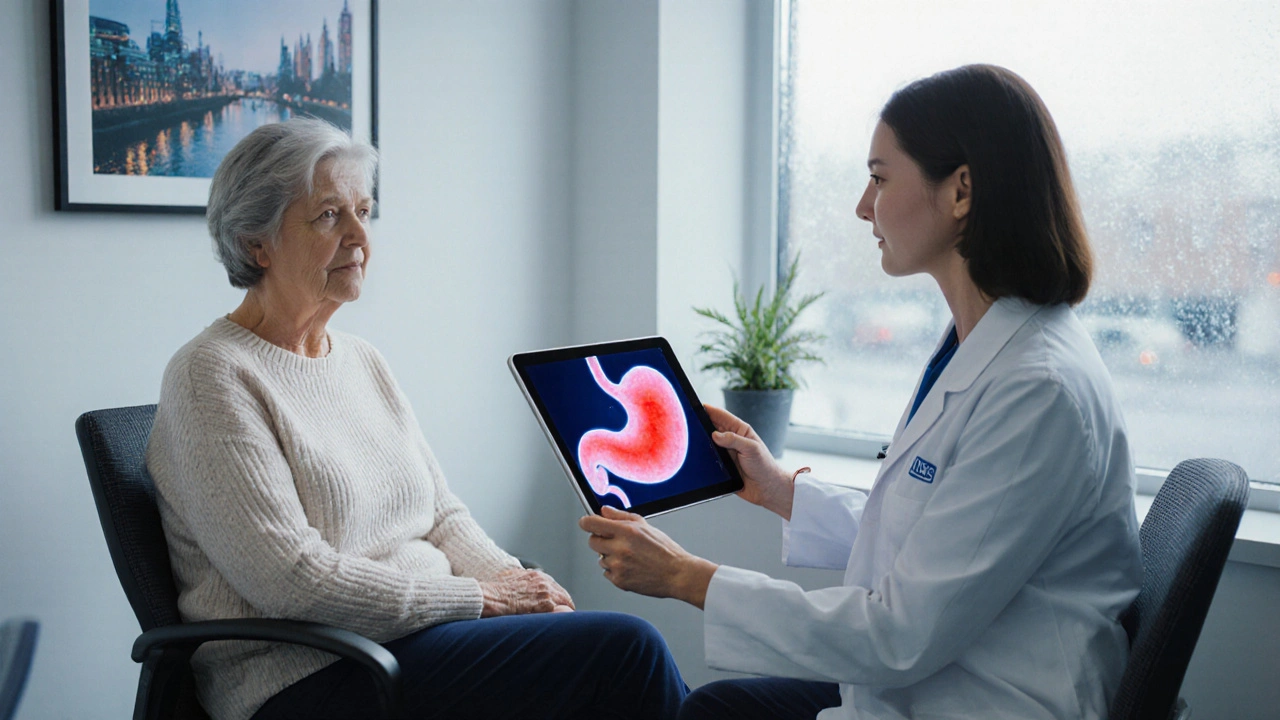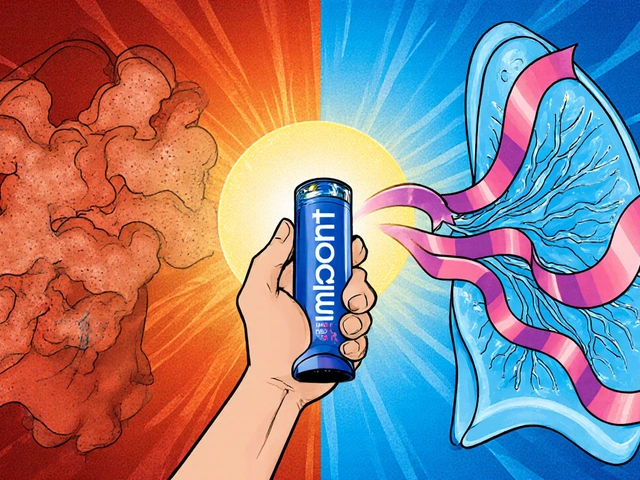
Upset Stomach vs Ulcer Quiz
Answer the following questions to assess your symptoms:
When you feel an upset stomacha vague discomfort in the abdomen often marked by nausea, bloating, or intermittent pain, you might wonder if it’s a sign of something deeper like a stomach ulcera sore that forms on the lining of the stomach or the first part of the small intestine. The link isn’t just coincidence; the same irritants that stir up a temporary ache can, over time, erode the protective mucus and turn a mild upset into a painful ulcer.
Helicobacter pyloria spiral‑shaped bacterium that colonises the stomach lining in about half of the world’s population is a major driver of chronic inflammation. When the bacteria release toxins, they weaken the mucous barrier, making it easier for stomach acid to damage tissue and eventually create an ulcer.
Regular use of nonsteroidal anti‑inflammatory drugs (NSAIDs)common pain relievers like ibuprofen, naproxen, and aspirin also strips away the protective mucus. Even if you only take them sporadically for a headache, they can turn a simple upset stomach into a persistent sore.
acid refluxthe backflow of stomach acid into the esophagus often leaves a burning feeling that mimics an ulcer’s pain. When reflux events are frequent, the stomach itself can become irritated, leading to gastritisinflammation of the stomach lining, a known precursor to ulcer formation.
Low levels of digestive enzymesproteins that break down food in the stomach and small intestine may cause food to sit longer, increasing gas and discomfort. Chronic stresspsychological pressure that triggers cortisol release can also boost acid production, amplifying both the upset stomach sensation and ulcer risk.
Quick Takeaways
- Upset stomach and ulcers share many triggers-H. pylori, NSAIDs, stress, and acid reflux.
- Persistent pain, weight loss, or vomiting blood are red flags for an ulcer.
- Eliminate or limit NSAID use, manage stress, and treat H. pylori to stop the progression.
- Diet changes like avoiding spicy foods and alcohol can calm both conditions.
- See a doctor if symptoms last more than two weeks or worsen.
What Exactly Is an Upset Stomach?
An upset stomach, medically known as dyspepsia, covers a range of uncomfortable sensations after eating. Common complaints include heartburn, bloating, nausea, and a vague ache that comes and goes. Most of the time it’s harmless and resolves with simple home measures, but the underlying cause can sometimes be a deeper problem.
Understanding Stomach Ulcers
Stomach ulcers, part of a broader condition called peptic ulcer disease, are open sores that develop on the lining of the stomach or duodenum. They form when the protective mucus layer is breached, allowing corrosive gastric acid to eat away at tissue. If left untreated, ulcers can bleed, perforate, or cause severe pain that interferes with daily life.
Understanding the connection between an upset stomach and ulcers can help you act before pain becomes chronic.
How the Two Conditions Interact
The relationship is a classic case of “cause and effect.” Repeated irritation from an upset stomach weakens the stomach’s defenses. For example, frequent bouts of acid reflux keep the lining bathed in acid, gradually wearing down the mucus. Add a bacterial infection like H. pylori, and the lining is even more vulnerable. Over weeks or months, the same irritants that cause temporary nausea can evolve into a lasting ulcer.

Warning Signs That Your Upset Stomach Might Be an Ulcer
Not every stomach ache signals an ulcer, but certain red flags should prompt a medical check‑up:
- Burning pain that improves briefly after eating but returns a few hours later.
- Weight loss without trying, often due to loss of appetite.
- Vomiting that contains blood or looks like coffee grounds.
- Black, tarry stools - a sign of internal bleeding.
- Persistent nausea that lasts more than two weeks.
If you notice any of these, schedule a visit with your GP or a gastroenterologist.
Key Risk Factors and Lifestyle Culprits
Besides the obvious bacterial and medication triggers, everyday habits can tip the balance:
- NSAID usage: Even over‑the‑counter painkillers erode mucus.
- Alcohol consumption: Alcohol directly irritates the lining and raises acid output.
- Smoking: Nicotine reduces bicarbonate production, weakening the barrier.
- Spicy or fatty foods: They can increase acid production and slow gastric emptying.
- Irregular meals: Skipping meals leaves acid unbuffered for longer periods.
Trigger Comparison: Upset Stomach vs Ulcer
| Trigger | Upset Stomach Effect | Ulcer Effect |
|---|---|---|
| H. pylori infection | Gas, mild pain | Chronic inflammation leading to sore |
| NSAID use | Irritation, nausea | Mucus erosion, ulcer formation |
| Stress | Increased acid, discomfort | Acid spikes accelerate tissue damage |
| Alcohol | Burning, bloating | Direct mucosal injury |
| Spicy foods | Transient heat sensation | Can aggravate existing sores |
Diagnosing and Treating Ulcers
Doctors usually start with a questionnaire about symptoms, medication use, and lifestyle. The most reliable tests are:
- Endoscopy: A thin camera visualises the ulcer directly.
- Urea breath test or : Detect H. pylori infection.
- Blood test for anemia, indicating possible bleeding.
Treatment combines eradication of H. pylori (a two‑week cocktail of antibiotics and a proton‑pump inhibitor) with lifestyle changes. For non‑bacterial ulcers, proton‑pump inhibitors or H2 blockers reduce acid production, allowing the tissue to heal.
Prevention: Keeping Your Stomach Calm
Prevention is mostly about protecting the mucus barrier:
- Reserve NSAIDs for short‑term use; consider acetaminophen for mild pain.
- Limit alcohol to moderate levels (no more than 14 units per week).
- Quit smoking - it improves blood flow to the stomach lining.
- Eat smaller, regular meals and chew food thoroughly.
- Include probiotic‑rich foods (yogurt, kefir) to help maintain a healthy gut flora.
- Manage stress through exercise, meditation, or hobbies; lower cortisol means less acid.
If you already have an ulcer, follow your doctor’s medication plan and avoid the triggers listed above until the sore fully heals.

Frequently Asked Questions
Can an occasional upset stomach cause a permanent ulcer?
A single episode rarely leads to a lasting ulcer. It’s the repeated irritation-like chronic NSAID use or an untreated H. pylori infection-that turns temporary discomfort into a persistent sore.
How long does it take for an ulcer to heal?
With proper medication and lifestyle changes, most ulcers improve within 4‑6 weeks. Full healing may take up to 8 weeks, especially if the cause isn’t removed.
Is it safe to take ibuprofen for a sore stomach?
Generally no. Ibuprofen is an NSAID and can worsen the mucus barrier, increasing ulcer risk. Opt for acetaminophen or discuss alternatives with your doctor.
Can dietary supplements heal ulcers?
Supplements like zinc‑carnosine or deglycyrrhizinated licorice (DGL) have shown promise in supporting mucosal health, but they should complement-not replace-medical treatment.
When should I see a doctor for stomach pain?
If pain is severe, lasts more than two weeks, is accompanied by vomiting blood, black stools, unexplained weight loss, or fever, seek medical attention promptly.






Warren Neufeld
September 29, 2025 AT 01:14I get how scary it can feel when you notice that burning pain after meals. It’s often easy to brush it off as just a bad night of eating, but those recurring aches could be a sign that your stomach lining is getting worn down. If you’ve been taking ibuprofen or dealing with a lot of stress, give your gut a break and watch the symptoms. A simple change like skipping the spicy food for a week can show if things improve. And if you start seeing any dark stools or vomiting blood, don’t wait – see a doctor right away.
Dipankar Kumar Mitra
October 12, 2025 AT 21:32Life is a series of fleeting comforts and hidden storms, and your gut is no different. The moment you ignore that lingering nausea, you’re signing a pact with the very acids that churn inside you. It’s not just about pills; it’s about confronting the turmoil you carry night after night. When you balance your mind with your meals, the ulcer’s shadow recedes. So, step out of the passive haze and claim your health with the same intensity you claim your thoughts.
Tracy Daniels
October 26, 2025 AT 16:51Understanding the link between dyspepsia and ulcers can empower you to take proactive steps. First, schedule a non‑invasive H. pylori test if you haven’t already – it’s often the silent culprit. Second, replace NSAIDs with acetaminophen when possible to protect the mucosal layer. Third, incorporate probiotic‑rich foods like yogurt to support gut flora. Lastly, keep a symptom diary; patterns are easier to spot when written down. You’ve got this! :)
Hoyt Dawes
November 9, 2025 AT 13:09What a waste of time.
Jeff Ceo
November 23, 2025 AT 09:28Stop dismissing the warning signs and get a proper evaluation now. Ignoring persistent burning or weight loss only gives the ulcer more time to worsen.
David Bui
December 7, 2025 AT 05:46Honestly most people think a little heartburn is nothing but they don’t realize how quickly the lining can wear down when you keep popping pills or chugging coffee it’s a recipe for disaster let’s be real.
Alex V
December 21, 2025 AT 02:04Sure, blame the “stress” and “spicy food” while the real culprits are the government‑mandated “acid‑suppression” pills designed to keep us dependent. Wake up and stop being a lab rat, the ulcer is a warning sign from your own body, not a plot.
Robert Jackson
January 3, 2026 AT 22:23This article properlys speaks about a topic that many brits ignore but we know better we cant let american diet ruin our health its our duty to spread the word.
Maricia Harris
January 17, 2026 AT 18:41Another sensational piece that overstates the danger, as if every bout of indigestion is a ticking time bomb. The drama feels forced and the facts are barely dressed in hype.
Tara Timlin
January 31, 2026 AT 15:00Ulcers are often misunderstood, so let’s break down what actually happens inside your stomach. When the protective mucus layer is compromised, gastric acid starts to erode the underlying tissue, leading to the formation of an open sore. The most common culprits are Helicobacter pylori infection and regular use of NSAIDs such as ibuprofen or aspirin. Even occasional over‑the‑counter painkillers can tip the balance if you already have a sensitive lining. Stress alone doesn’t cause ulcers, but it can increase acid production, making existing irritation worse. Lifestyle choices like excessive alcohol consumption, smoking, and eating large, fatty meals also play a significant role. If you notice a burning pain that eases after meals but returns a few hours later, that’s a classic sign of an ulcer. Weight loss without trying, vomiting blood, or black tarry stools are red‑flag symptoms that require immediate medical attention. Diagnosis typically involves an endoscopy to visualize the ulcer directly, or non‑invasive tests for H. pylori. Treatment usually starts with a combination of antibiotics to eradicate the bacteria and proton‑pump inhibitors to reduce acid secretion. In many cases, ulcer healing occurs within a few weeks once the irritants are removed. It’s also crucial to avoid NSAIDs during recovery and switch to safer alternatives for pain relief. Incorporating a diet rich in fiber, fresh fruits, and vegetables can aid the healing process. Probiotic‑containing foods may also support gut health and reduce recurrence. Finally, keep a symptom journal to track what foods or activities trigger discomfort, and discuss the findings with your healthcare provider. By taking these steps, you can prevent a simple upset stomach from escalating into a chronic ulcer.
Jean-Sébastien Dufresne
February 14, 2026 AT 11:18Wow, what a comprehensive guide!; you’ve covered everything from causes to treatment, and even added practical tips-truly impressive! 😃; I especially appreciate the reminder about symptom journaling; it’s a game‑changer for spotting patterns.